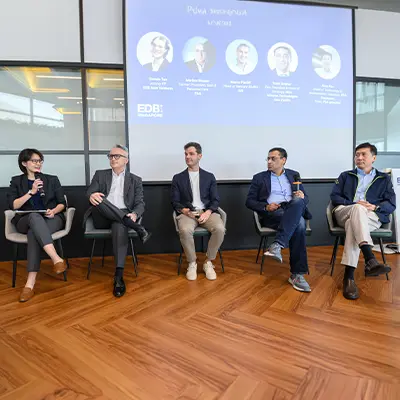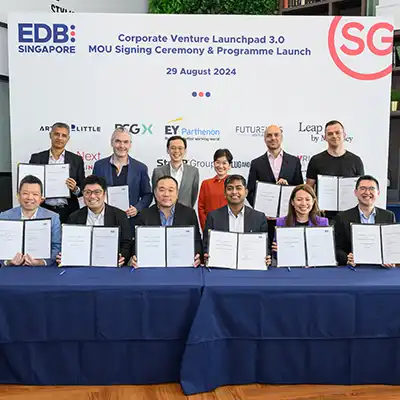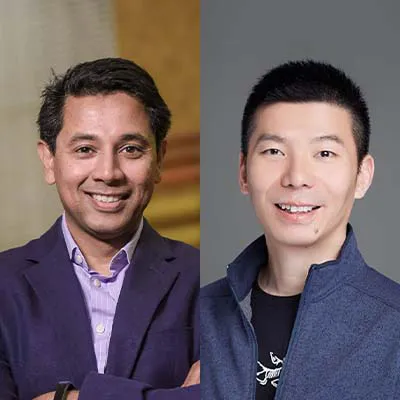An Access Point to the Rest of Asia
Choo said he’s seeing more companies, from agile tech startups to multinational corporations, set up research and development centers, innovation hubs and centers of excellence in the country because of its ability to attract high-quality talent.
Recent announcements by global tech companies reinforce Singapore’s attractiveness as a regional innovation launchpad, especially for companies interested in tapping into AI opportunities. For example, Amazon Web Services announced plans to double down on its investment in its existing cloud infrastructure in Singapore to more than $17 billion (SGD$23 billion) by 2028 to support customer demand, and the launch of a flagship AI program, AWS AI Spring, to enable the adoption of AI across the local economy and the training of talent. In addition, Nvidia has collaborated with the Singapore Institute of Technology on the launch of a new SIT Centre for AI to bolster AI adoption across industries and to boost an AI talent pipeline that will contribute to Singapore’s aim of tripling the number of AI practitioners in the country within the next five years.
Executives from tech companies including Snowflake and Rubrik also concurred that Singapore’s strategic location makes it a great launchpad for the rest of Asia, with both companies having set up their regional headquarters in Singapore. Fly four hours and you’ll have access to the rest of Southeast Asia’s swiftly growing economy. Fly seven hours and you’ll be able to access the rest of Asia Pacific—including more than half the world’s population.
As Choo mentioned at the dinner, Singapore is especially attractive to experienced founders ready to make their next move and has created programs to encourage those moves. We are seeing the next wave of founders, including early employees of big tech companies, choosing to build new ventures in Singapore. For example, Anthony Tan, co-founder and group CEO of Grab, a NYSE-listed startup and Southeast Asia’s first decacorn, moved to Singapore in the early stages to tap on the capital and talent pool and grow its global business. And Caesar Sengupta, formerly a vice president at Google, continues to call Singapore home for his new venture, Arta Finance, which has a dual-hub arrangement across Singapore and the U.S.
“These are experienced founders and executives who have decided to bring their families and spend their next phase of life in Singapore,” he said. Part of the attraction is the livability of the country. An executive from Navan shared positive memories about living in Singapore during his childhood, highlighting its safety and vibrancy for families. Singapore remains the most livable city for Asian expats, ranking near the top globally for efficient healthcare, safety, quality education and ease of doing business.
Creating Home-Grown AI Experts
The discussion turned to Singaporean companies wanting to break into AI. A key focus is finding the talent to spearhead these efforts.
Singapore believes in the transformative potential of AI, and it has put in place the National AI Strategy 2.0, which represents the country’s commitment to realize the benefits of AI and create exciting new opportunities. It was one of the first countries to introduce a national AI strategy, in 2019.
To nurture a pool of AI-ready practitioners, Singapore is investing in an AI accelerated master’s program in collaboration with local universities. Singapore is also launching an AI visiting professorship to attract world-class AI researchers to establish collaborations in Singapore. As one member of the EDB said, “We are getting visiting professors to bring their expertise and research to Singaporean students. We want to give students a sense of what it really means to be at the top of the game and eventually to coalesce these centers of talent.”
To catalyze enterprise experimentation and innovation with emerging technologies like AI, the government has also put in place AI-focused accelerator programs and innovation regulatory sandboxes to spur the creation and validation of new ideas. One example is the AI Trailblazers Initiative, a first-of-its-kind generative AI–focused accelerator in collaboration with Google Cloud to support the development of high-potential AI startups.
This article was originally published on The Information. If you’re interested to learn more about Singapore’s business environment, download our comprehensive Guide to Setting Up Your Business in Singapore.








